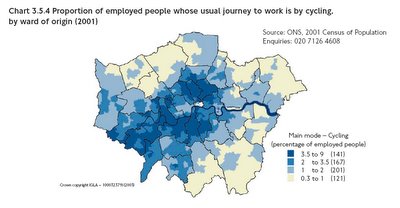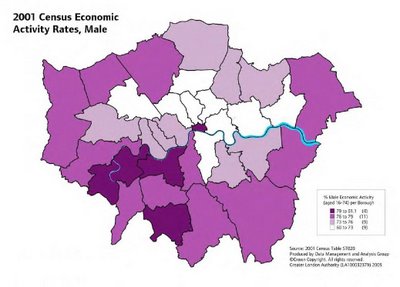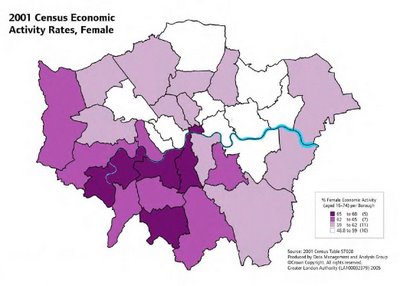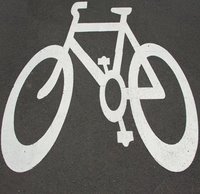Cyclists are seen on the roads, making good progress with their high average speed in London. But where do they come from?
An interesting insight to such questions, is provided by the Office for National Statistics (ONS) 2001 Census results below:

Headlines
The results show a ringed zone of boroughs surrounding central London, where a higher percent of employed people choose to commute by bicycle, as their predominant mode of travel.
The largest cluster away from central London, appears across South West London.
Comments
From the swarms of cyclists in the city, it is easy to assume all routes are destined for central London. This is a limitation of these ONS results - It conveys only the starting point, i.e. Where the cyclists live. Journeys might actually travel west to south, north to north, west to north, or wherever. Not necessarily in to central London.
As at 2001 the biggest percentage noted (of employed commuters cycling,) was only 9% in this survey. This is roughly 1 in 10 people employed. I think this figure will be dramatically improved in the next Census results.
Can you imagine if this statistic was flipped on its head and 9 in 10 people commuted by cycle, things would be a lot quieter, safer, and healthier than they are now.
Judging by the areas on the diagram, typical distances cycled could be roughly 5 - 10 miles each way, as a guestimate.
Rich, Successful, Bike Commuters
South West London enjoys notably more cycle commuting residents than the other compass points, which raises a few questions: Why are two-wheeled journeys to work more popular from the South West of London? Are there amazingly good cycle facilities in South West London? Or is there a link between wealth or socio-economic groups, and the popularity of cycling...?
A report by the AA called "Cycling Motorists," also referred to here, investigated attitudes on the roads in 1993. One of the findings helps us answer our last question:
"Those in the higher income groups are more likely to cycle."
1993 was a long time ago, so how about some more up to date evidence: The 2001 Census below, charts the "economic activity" of London Borough residents. This is the number of people in work, (or not currently in work, but able to work within 2 weeks) living in each London borough. The results below, match the South West's high economic activity, with corresponding areas of high cycle commuting shown above.


Technorati Tags: London / Boroughs / Cyclists /






